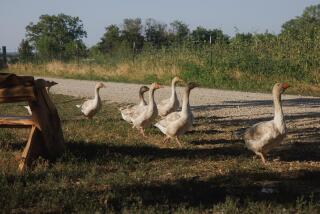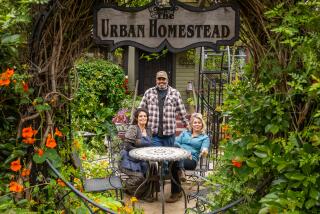On British Farms, It’s Adapt or Die
- Share via
TELFORD, England — Chris Taylor, whose roots in farming reach back more than 400 years, has traded his herd of cattle for livestock less typical of the chilly English countryside--tropical birds.
Fed up with low milk prices and the “mad cow” crisis, Taylor and his wife, Rebecca, sold off the last of their 100 dairy cows five months ago, rented out most of their 150 acres and converted their barns into aviaries.
“It was a big decision. Took a good 12 months to make me mind up,” Taylor, 48, said in a clipped Shropshire county accent. “But I’m glad to be free of it. So many years of not getting anywhere. You try to climb the ladder, and always something knocks you back.”
But parrots in England?
“Oh, these birds are bred here. They don’t know what hot weather is,” Taylor said with a shrug.
While the Taylors’ choice of breeds may be unconventional, their decision to diversify is increasingly common among Britain’s family farmers, who are struggling to stay afloat during the worst crisis to hit the country’s agricultural sector in more than half a century.
Farm income has plummeted 75% during the last two years, according to the National Farmers Union, accelerating a transformation of British farming much like the one that has already taken place in the United States: Family farmers are being driven out of business, and food cultivation is becoming concentrated in fewer hands on larger farms.
So far, this may not have altered the verdant British landscape, engraved in the world’s imagination by the brush strokes of John Constable and the prose of Thomas Hardy.
But it is fast bringing an end to a centuries-old way of life for rural England’s tightly knit communities of farmers. These men and women of few words and sturdy stock, accustomed to toughing out the bad years awaiting the good, no longer see a future in the land.
City Dwellers Escape to the Countryside
As Britain’s rising standard of living has more city dwellers escaping to the countryside, farmers are urging their children to head for urban areas. Many are giving up themselves.
In Britain, the causes of this change are many. Under a common European agricultural policy, farmers face quotas limiting how much they can produce. At the same time, an international downturn in prices for agricultural commodities has been compounded by high interest rates, the pound’s strength relative to the dollar and the euro--making British food exports more expensive and foreign imports cheaper--and an epidemic of bovine spongiform encephalopathy, known as BSE, or “mad cow” disease.
The British farming industry estimates that it lost nearly $2.5 billion during the three-year worldwide ban on British beef exports because of the epidemic, and although the embargo was lifted Aug. 1, cattle farmers fear that they may never recover their trade.
Other markets also have disappeared. The collapse of the Russian economy last year eliminated a huge demand for British sheep hides for coats and rugs, driving down the price per head earlier this year to the equivalent of a packet of potato chips.
At one point earlier this year, some farmers said, it was cheaper to give the sheep away than take them to market.
Furthermore, a change in British buying habits away from small shops and in favor of supermarkets has affected the prices farmers can demand for their goods. Supermarket chains buy larger quantities and, therefore, demand lower prices. Their loyalty goes to the producer who makes the best deal--anywhere in the liberalized European food market--and not to the family farmer who may have supplied a shop for generations.
The result is pressure for larger, high-tech farms that can produce at a lower cost per quart of milk or pound of potatoes, forcing many family farmers to give up and most of the others to diversify.
Neither the government nor the farmers union has precise figures for family farmers who have gone broke. In part, that is because the farmland remains in production and, so far, relatively few farmers have declared bankruptcy.
Like the Taylors, many family farmers still own the land where they live and rent out most of the acreage to large-scale farmers while seeking other sources of income. They are leaving farming but have not yet left the farm.
The Taylors’ friend Bill Bromley is another example. He has already quit cattle farming on his 500 acres in Telford and is gradually giving up grain and sugar beet farming in favor of breeding racehorses.
“The small man is being driven out. They’re killing us off quietly,” Bromley said. “You’ve got to be big, 2,000 to 5,000 acres, or you can’t make it.”
So horse breeding, which started as a hobby, is becoming a business. “I’m putting the farm down to grass, and in three years’ time, I won’t be farming anymore,” Bromley said.
The trend is only beginning to show in numbers. According to government figures, 5,000 farmers--about 1.7%--quit tilling the land between 1987 and 1997. Of those who remained, 10% went from full-time farming to part-time farming.
“The last two years will have seen a dramatic acceleration in this decline,” said John Marsh, chairman of the Agricultural Wages Board and a member of the Foresight Panel, which looks at the future of farming in Britain.
Marsh notes that the rising standard of living in Britain is creating added pressures on farmers. As people earn more, they spend a smaller proportion of their salaries on food, meaning that farmers aren’t sharing in the boom. Day laborers demand higher pay, which family farmers often cannot afford. Meanwhile, wealthier city folk began to buy second homes in the countryside, driving up the prices of rural properties.
“The price of rural land has little to do with the value of land in farming,” Marsh said.
According to the farmers union, only about a third of Britain’s farmers received all of their income from farming in 1998, compared with half of them five years before. For the fortunate ones, that may mean income from investments and pensions. Or, as with Bromley and the Taylors, from a newfound business they enjoy.
But many others have not been as lucky. Chris Taylor’s childhood friend Alan Wilcox has rented out most of the 150 acres where he used to grow corn, sugar beets and potatoes and is contracting out his labor and machinery. His wife has gone to work in town as a bank teller.
“I grew up here going out with my father to farm. It’s my life. It means everything to me,” Wilcox said. “All I ever wanted to do was farm, and that’s what I thought I’d do. But we’ve had to do different jobs and rent out the land which I’d rather be farming myself.”
The transformation is also seen to the north. In Yorkshire, farmer Don Wilkinson sold his 300-acre cattle farm to buy a more picturesque 30 acres, where he is opening a bed and breakfast for tourists.
And sheep farmer Beryl Otley pulls the added income out of hats--literally.
Otley and her husband, Barry, have scaled back their sheep-breeding business from 90 to 11 acres of their farm and rent out the rest of the land. Meanwhile, she opened a hat shop in her barn that has grown into a collective of 11 stores, all run by farm women on their land.
“We do hats for racing, weddings, investitures, garden parties, whatever. We do hundreds of thousands of pounds of business annually,” Otley said. “It by no means replaces farming. The turnover of hats would never save a farm. But it does contribute to the running of the farm. It helps.”
Who goes to a farm to buy a hat?
“Lots of women. A 200-pound [$320] hat here costs twice as much in the stores. Here, it’s laid-back shopping. You can stay two hours and don’t get a ticket on your car. And if you have a small head, we’ll make you a small hat. If you have a large head, we’ll make you a large hat,” Otley said.
The proof is in the pudding. The business is doing so well that Otley has 148 applications on file from other women who want to join the collective and open shops on their farms.
Otley agrees with the advice that the farmers union gives to British farmers that they must look for creative solutions.
“There are other ways of farming than bashing out a lot of food that people don’t want,” Otley said.
One alternative, she said, is organic farming. Increasingly health- and taste-conscious Britons are demanding more organic food than Britain is producing. Right now, 70% of organic food is imported.
The farmers union and the government are telling farmers to either grow in size, sell collectively as if they were large farms, or diversify--although a $10-million government fund established this year to encourage diversification projects such as organic farming already has been used up.
For those who do not go in for organic farming, the farmers union suggests growing genetically modified crops--a controversial but potentially lucrative use of new technology in agriculture.
Look of Rural England Unlikely to Alter Much
It also urges farmers to look at environmental and tourism business in a lush countryside that has always drawn nature lovers from around the world. Farm economists believe that the look of rural England is not likely to change radically despite the changes in farming.
“The countryside is more resilient than a lot of alarmists say,” Marsh, the agricultural economist, said. “I would expect the majority of farmland to continue to be farmed.”
Albeit by fewer people.
Rebecca Taylor, who lends her name to the family business, Beck’s Bird Barn, never imagined she would be part of the change.
“Five years ago, if you had said to us that you’ll be packing in milking, we’d have laughed our socks off. It was what we did,” she said, shaking her head in amazement. “We still have to pinch ourselves that we made it. Others don’t, and they don’t know what to do. They’re our friends.”
More to Read
Sign up for Essential California
The most important California stories and recommendations in your inbox every morning.
You may occasionally receive promotional content from the Los Angeles Times.










